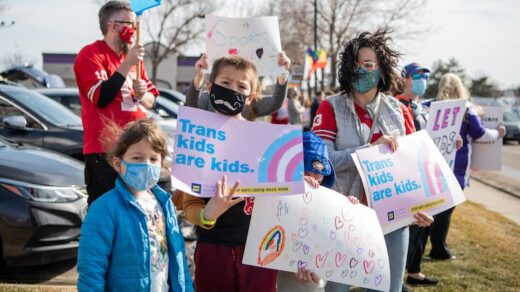Here are all of Trump’s executive orders that have targeted transgender people — so far
Author: Trudy Ring
Donald Trump’s second term as president has begun with a flurry of anti-LGBTQ+ executive orders, especially targeting transgender people but with consequences for the whole LGBTQ+ population as well as other historically marginalized groups. Here we look at all of them.
Keep up with the latest in LGBTQ+ news and politics. Sign up for The Advocate’s email newsletter.
The “two sexes” order denying the existence of trans, nonbinary, and intersex people
On his first day in office, January 20, he issued an order stating, “It is the policy of the United States to recognize two sexes, male and female. These sexes are not changeable and are grounded in fundamental and incontrovertible reality.” That denied the existence of trans, nonbinary, and intersex people.
Each federal department and agency is tasked with implementing the order, but some already have. The State Department has ceased issuing passports with an X gender marker or letting passport holders change their gender on them. The Equal Employment Opportunity Commission has announced it will no longer consider certain forms of anti-trans workplace discrimination or harassment to be sex discrimination.
Also, soon after Trump signed the order, references to LGBTQ+ identities and HIV-related resources vanished from WhiteHouse.gov and several federal agency websites, including the Centers for Disease Control and Prevention, Department of State, and Department of Labor.
Revoking workplace protections
Also on his first day in office, he issued orders rescinding many of the orders President Joe Biden put in place expanding antidiscrimination protections for various populations, and he ordered an end to all diversity, equity, inclusion, and accessibility programs across the federal government, claiming, “These programs divided Americans by race, wasted taxpayer dollars, and resulted in shameful discrimination.” In actuality, they assured that groups who’d suffered discrimination in the past, including LGBTQ+ people, would get a fair chance.
On January 22, he also revoked Executive Order 11246, a directive first issued by President Lyndon B. Johnson in 1965 to combat workplace discrimination and advance affirmative action. The new order eliminates requirements for federal contractors to implement affirmative action policies or to ensure that their workforces reflect the diversity of the nation. It also prohibits federal hiring practices from considering diversity, equity, and inclusion factors, focusing instead on what the administration calls “merit-based” systems.
Executive Order 11246 originally stated, “The contractor will not discriminate against any employee or applicant for employment because of race, color, religion, sex, or national origin.” Over time, it expanded to protect against discrimination based on sexual orientation and gender identity.
Monday night, aboard Air Force One, Trump signed an order that will reinstate the ban on trans people in the military, which Biden lifted in 2021 after Trump put the ban in place during his first term. It does not reinstate the ban immediately, but it gives newly confirmed Defense Secretary Pete Hegseth 30 days to submit a plan. “Expressing a false ‘gender identity’ divergent from an individual’s sex cannot satisfy the rigorous standards necessary for military service,” the order reads. “Beyond the hormonal and surgical medical interventions involved, adoption of a gender identity inconsistent with an individual’s sex conflicts with a soldier’s commitment to an honorable, truthful, and disciplined lifestyle, even in one’s personal life.”
In further justification, the order describes transgender identities as fundamentally incompatible with military values: “A man’s assertion that he is a woman, and his requirement that others honor this falsehood, is not consistent with the humility and selflessness required of a service member.” It continues, “For the sake of our Nation and the patriotic Americans who volunteer to serve it, military service must be reserved for those mentally and physically fit for duty.”
Addressing claims that medical care for transgender people could disrupt readiness, SPARTA Pride noted that while some service members undergo surgery, “the recovery time and cost is minimal and is scheduled so as not to impact deployments or mission readiness,” comparing it to “a non-emergent minor knee surgery.” The group added that “the readiness and physical capabilities of transgender service members is not different from that of other service members.”
The Modern Military Association of America advised people affected by the ban that trans service members and their families should seek support and understand their rights. Modern Military noted that affected service members are entitled to due process and, if discharged, will likely receive honorable discharges with full benefits.
Under the previous ban, trans people already serving in the military were not discharged but were considered “grandfathered” in. But it prevented further enlistments by trans Americans.
Lambda Legal and the Human Rights Campaign have announced plans to sue over the new ban.
Ending federal funding for gender-affirming care
Trump signed an order Tuesday to restrict federal funding and support for gender-affirming care for transgender minors and some adults, which he described as harmful and irreversible. The order, titled “Protecting Children from Chemical and Surgical Mutilation,” targets the use of puberty blockers, hormone therapies, and surgeries for anyone under 19, referring to them as “chemical and surgical mutilation.” It directs federal agencies to rescind policies supporting such treatments, withdraw funding from institutions that provide them, and enforce existing laws limiting access to these procedures.
The order requires the Department of Health and Human Services to review and revise medical guidelines related to gender-affirming care. It specifically singles out the World Professional Association for Transgender Health and its Standards of Care, calling it lacking in “scientific integrity.” HHS is instructed to publish a review of the existing literature on gender dysphoria and develop alternative guidelines, while agencies like the Department of Justice are tasked with investigating providers and enforcing stricter legal measures against what the order terms “deceptive practices.”
In addition to limiting federal funding, the order directs the Department of Defense to exclude coverage for gender-affirming care under TRICARE, the military’s health care system, and requires the Office of Personnel Management to negotiate reduced premiums by eliminating coverage for pediatric transgender treatments under federal employee health plans. Whistleblower protections are also mandated for those opposing gender-affirming treatments within health care systems.
In reality, gender-affirming care is supported by every major medical organization.
Targeting trans students and supportive educators
Trump signed an executive order Wednesday barring schools that receive federal funding from allowing students to identify with the name and pronouns that best match their gender identity. It also bans the use of bathrooms and lockers by trans kids that best fit their gender identity and bans them from playing on the most appropriate sports team. Advocates say the order forces schools to deny the existence of transgender people.
The order additionally targets the schools, teachers, counselors, and staff who support trans youth. It requires parents of students to be notified if students request to use a different name or pronoun, potentially outing the student. Trans rights activists note this could put these students at risk of harm.
Nicholas Hite, an attorney with Lambda Legal, slammed the order as “patently unconstitutional nonsense designed to demean transgender and all LGBTQ+ young people.” The organization is considering legal options.
Exiting the World Health Organization
In another first-day executive order, Trump announced his intention to for the U.S. to leave the World Health Organization, which coordinates responses to disease outbreaks around the world and shares information with member countries. It has done much work on diseases that have disproportionately affected LGBTQ+ people, such as HIV and mpox.
“Disengaging from the W.H.O. would rob the United States of crucial information about emerging outbreaks like mpox and resurgent dangers like malaria and measles, public health experts said,” according to The New York Times. “It may also give more power to nations like Russia and China in setting a global health agenda, and it could hurt the interests of American pharmaceutical and health technology companies.”
The withdrawal can’t happen for a year because of an existing agreement and may need congressional approval. But WHO has already begun cutting its budget, as the U.S. supplies a large chunk of the organization’s funds.
Trump has eased off a tiny bit, saying he’s open to negotiations with WHO. However, he has a grudge with WHO Director-General Tedros Adhanom Ghebreyesus, with Trump saying Tedros treated China better than the U.S. during the COVID-19 pandemic. Trump also claimed Tedros denied China’s responsibility for the pandemic.
Tedros “did repeat Chinese talking points about Covid’s transmission and praised China’s response to the outbreak when little was known about the virus,” Politico reports. “And, in line with the WHO’s policies, he did criticize the U.S. border closure [to the Chinese]. But both the WHO and Tedros reject Trump’s claims that they favored China.
“This is too important to be left to personal grudges,” said Larry Gostin, a Georgetown University law professor who assists WHO, told Politico.
Trump has also ordered the Centers for Disease Control and Prevention to cease communications with WHO.
An order freezing foreign aid was another threat to global health, as it at first included PEPFAR, the President’s Emergency Plan for AIDS Relief, which helps developing countries fight the disease. This came even though it was started by another Republican president, George W. Bush, and Trump supported it in his first term, as did new Secretary of State Marco Rubio when he was a U.S. senator. The State Department is in charge of foreign aid. However, Rubio later said PEPFAR would be exempt from the freeze, though some have said the freeze is still being felt.
Original Article on The Advocate
Author: Trudy Ring





